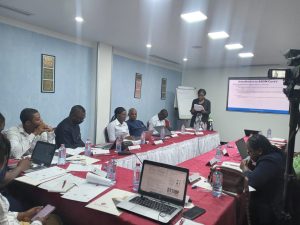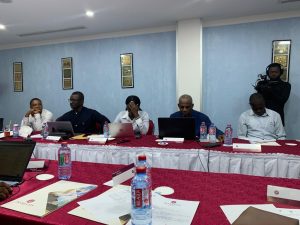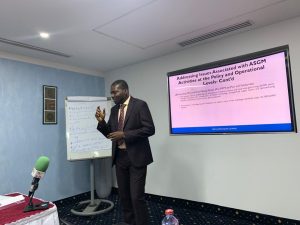The Fund for Peace (FFP), a Non- Governmental Organization (NGO), through its Responsive Engagements and Collective Learning Approaches to Inform Mercury Substitution (RECLAIMS) project is seeking to reduce mercury use in Artisanal and Small-Scale gold mining (ASGM) in Ghana.
They plan to achieve this by incentivizing less-harmful alternatives for gold processing and addressing the technical and methodological gaps in the adoption of these alternatives.
Speaking with members of the Journalists for Business Advocacy (JBA) at a capacity building in Accra, the Programmes Director of Fund For Peace, Wendy Wilson, noted that in the medium- to long-term, this will lead to improved licensing, regulation, and oversight of the ASGM sector and address current policy challenges to reduce environmental, health, and other vulnerabilities and risks.

She explained that the RECLAIMS-ASGM project seeks to address the ASGM issues at three different levels: local, regional and national/policy.
At the local level, the RECLAIMS-ASGM project is working with two pilot areas in the South (Western North Region) and the North (Upper East region) to showcase best mining practices.
The project is supporting capacity building on mercury-free and sustainable best sector practices and undertaking community sensitization.
Lessons and successes from these sites will be used to promote sustainable and safe ASGM practices. It will also be replicated and scaled up by the Government of Ghana (GoG) and other partners throughout the country,” Wilson noted.
She mentioned that the project is optimizing the “Sikabukyia” mercury-free technology for use across the country. This technology, she added, has been tested at the pilot mines in Sefwi Nkatieso and Talensi, with one “Sikabukyia” given to each mine for use and review.
Reports received so far suggest that the technology works for orebodies from both surface and underground operations,” she observed.
Artisanal and small-scale gold mining is present in over 80 countries, employing about 15 million miners and serving as source of livelihood for millions more. The sector is estimated to be the largest emitter of mercury globally.
For artisanal and small-scale gold miners, mercury amalgamation provides a simple and inexpensive solution to recover gold. The process entails combining mercury with gold-bearing ore or concentrate. A gold-mercury amalgam is formed, which is heated to vaporize mercury, leaving behind the gold.

Mercury is widely available, even in remote communities, and it enables miners to produce gold (and thus income) on a daily basis. This means that mercury amalgamation is often the default solution, and as a result causing harm to the environment.
Though useful in many areas including mining and the health sector, mercury can have adverse effect on both human health and the environment.
Recent reports revealed children born in areas prone to illegal mining in Ghana suffer cognitive impairment and other deformities due to the high use of metals such as mercury in gold extraction by galamsey operators.
Collaboration with Media
It is for this reason that the Fund For Peace has trained and is working with journalists from various media houses in the country to help create and intensify awareness on the alternatives to mercury use in gold production in artisanal and small-scale mining.
The training sought to convey the complexities of the Artisanal and Small-scale Mining sector to journalists and to equip them to report on various issues in the mining sector.
The journalists were taken through various topics such as the Introduction to Mining and ASGM, Evolution of policies and Legislation on ASGM sector, Issues Associated with ASGM Activities at the policy and Operational levels, the Role of the Media in ASGM and Responsible and Effective Reporting.
Wendy Wilson said that her outfit has identified journalists as key stakeholders in the mining landscape and believes that equipping them with knowledge on the ASGM sector will help journalists to convey stories in the sector easily to the public.
She stated that the ability of journalists to understand the difference between small-scale miners and illegal miners is also key in addressing major issues about mining in the country.
The Programmes Manager at Fund for Peace, Christopher Nyarko, also said that journalists play a significant role in the ASGM sector by ensuring transparency between and among stakeholders in the extractive industry.

He stated that journalists play a crucial role when they practice responsible and effective reporting in the sector to ensure both policy-level and operational-level changes.
He explained that effective reportage from journalists on ASGM can better inform citizens about the relationship between the extractive industry, government, community and broader economy.
Effective reporting on ASGM can manage the expectations of people with regard to proceeds from the extractive industry, and better inform stakeholders about the effect of mining activities in a community for necessary actions to be taken” he added.
The Programmes Manager urged journalists to understand and report on the social, physical and environmental effects of mining operations when dealing with cases of new operations.
As part of the guidance for effective reporting on the ASGM sector, he noted that reports from the sector should be easily comprehensible – that is, it should be clear, understandable, factual and coherent.
Christopher Nyarko indicated that journalists should carry out ASGM activities holistically, taking into account all aspects of the issues while investigating the problem.
On the topic of framing, he advised journalists to pay close attention to framing biases during their reportage on the ASGM sector to avoid running single-sourced stories.
Before publishing a report, journalists are obligated to speak with many sources. As a result, one's bias will be checked and balanced by sources from the opposing side of the argument,” he said.
He further advised journalists to be open-minded and unprejudiced on the issues or story.
Comments